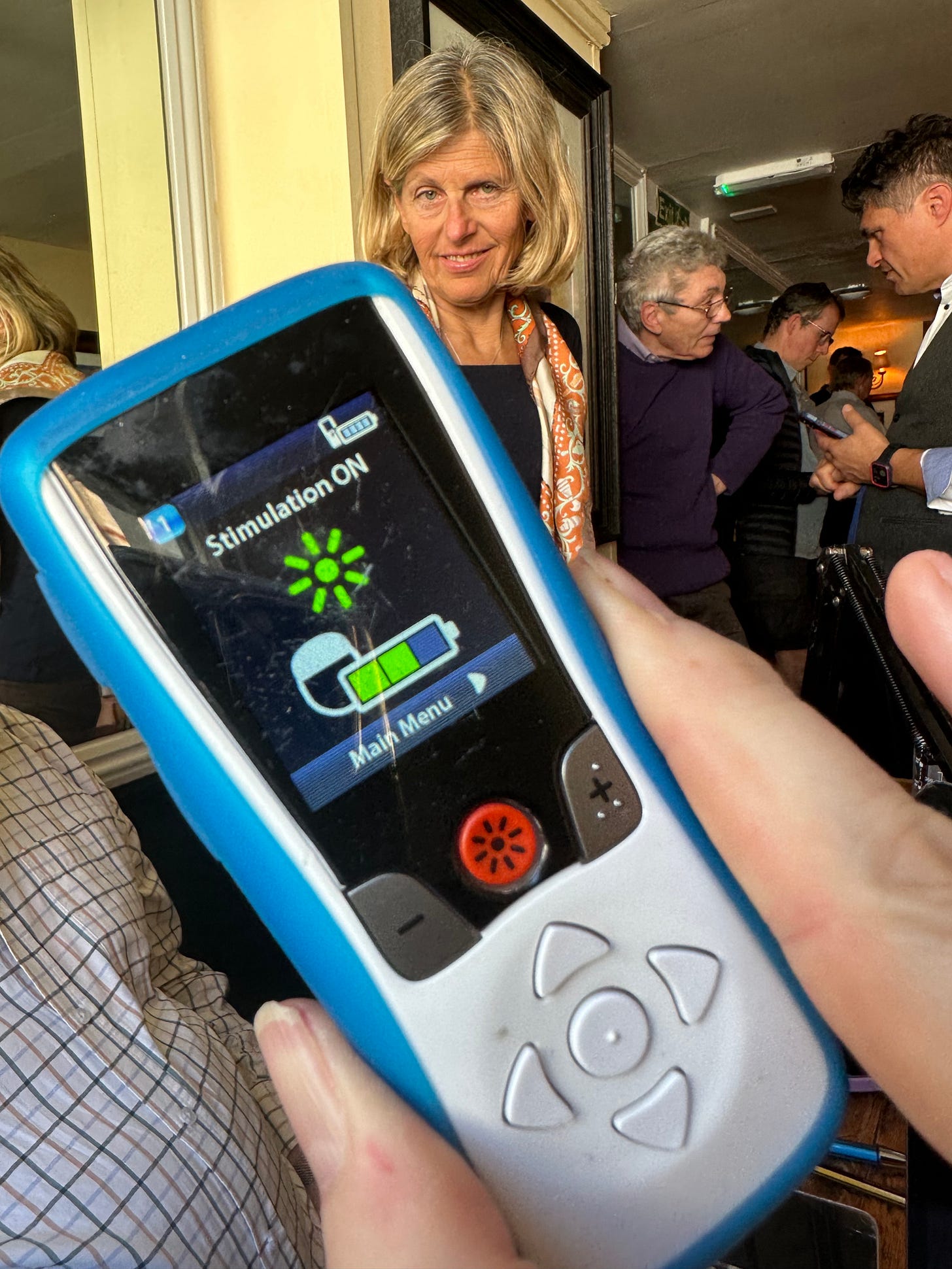Warning - you may find this week’s episode of Movers and Shakers disturbing. This time, the podcast about living with Parkinson’s is all about the most radical treatment for the condition, Deep Brain Stimulation (DBS).
This involves surgery that can last up to 8 hours where electrodes are permanently implanted in the brain and then used to jam the abnormal signals being sent to the body which are at the heart of Parkinson’s.
We have an expert on the team, Gillian Lacey-Solymar, who had the operation four years ago and is extremely satisfied with its impact. She shocks us by playing us a horrific clip of a video showing how much pain she was in from dystonia - a form of cramp - before she had DBS.
And she brings along to the pub the brilliant surgeon Professor Ludwic Zrinzo who did her operation - “the only man who has ever got inside my head,” as she puts it. He explains that deciding to have DBS involves lengthy discussions between the patient and the doctor to make sure it’s the right approach:
“Deep brain stimulation is one of the most successful surgical tools that we have. It's not for everybody and we have to ensure that we tailor our approach to helping people with Parkinson's according to what they need. Selecting the right patients is a very important part of the job, it's almost more important than the surgery itself. “
The Movers and Shakers have lots of questions. “How often does it not work?”asks Jeremy Paxman. The professor tells us it depends on what you mean by “work” and what the expectations of the patient are:
“Sometimes if expectations are unrealistic, then I would counsel someone not to undergo surgery. There's no point me doing surgery because I think it's going to help you if actually your expectation of what we're doing is unrealistic.”
Paul Mayhew-Archer, who is considering having DBS, wants to know about the dangers of the operation, having heard about someone who had a stroke and died. Professor Zrinzo accepts that can happen but says his hospital has operated on over 2000 people without any strokes or deaths.
I want to know whether the system is on permanently - Gillian shows us what looks like rather a chunky mobile phone which is in fact her DBS remote control. She explains that while she is not supposed to switch it off she does from time to time, especially when she goes swimming as it can be dangerous.
At the end we work out whether we are now keener to have DBS. Jeremy hadn’t fancied it beforehand - “I thought I'm not going to have some clown going and sticking electrodes in my brain” - but has decided that Professor Zrinzo isn’t a clown and has warmed to the idea.
Mark Mardell feels he’s at too early a stage to consider it but is “intellectually fascinated” by the idea. I too feel I’m not so afflicted by Parkinson’s that I need this - although my consultant startled me by mentioning DBS the last time we met - but some of my fears about the procedure have been allayed by what I heard in the pub.
Judge Nick Mostyn is not convinced - “I remain fearful of the thought of people drilling into my skull and someone poking around in my brain.”
But we all came away feeling better informed about this technique only invented in the late 1980s and in awe of people like Ludwic Zrinzo who are refining it and making the operation a much quicker and simpler affair.
Don’t forget you can send your thoughts about the podcast to feedback@moversandshakerspodcast.com.
We have a Facebook group open to all: https://www.facebook.com/groups/146780564990635/
Our Instagram account is: @moversandshakerspod
And our Twitter account is @moversand6





Aaagh you’re right. Corrected
Here are some of the things I have learnt about the disease having been diagnosed since 2010.
Everyone is different which makes diagnosis and drug regime very much down to the individual.
Access to a consultant is very difficult after the initial diagnosis.
I have access to a specialist Parkinsons nurse on the NHS via email and appointment in person. I have a default fee to face appointment on a 6 monthly cycle.
At these appointments she runs through all 40 odd symptoms to establish whether any new ones have developed and the level of existing. The nurse is excellent and through trial and error I have secured a regime of regular Stalevo taken every 2 hours. I vary my dose during the day depending on how I feel. The differential in the dose is between 75mgs to 100mgs
I set alarms on my mobile to remind me to take the meds. It is crucial to take the pills on time.
No regime is perfect. Get used to it. It’s taken me 10 years to get this right and I expect things will change as time goes by
The podcast is great
Tom Davis
Tel: 01565 654671
Mob: 07793 118900
Email: tom@egl.city